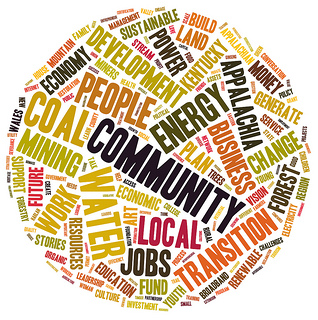Front Porch Blog

A word cloud created from workshops and panel sessions at the conference show the prevalence of positive thinking and themes. Courtesy of Kentuckians for the Commonwealth
I had never been to Harlan County. Sure, I’ve heard the songs, seen the movie, and know the stories, but nothing compares to being there, driving the Kentucky back roads, stopping in local shops, talking to folks.
It’s beautiful country, especially in April with the redbuds blooming and the bright greens of spring blushing up the mountainsides. It’s a friendly place – people went out of their way to make me feel welcome.
It also has more than its share of economic troubles. This is coal country, after all, where big companies haul out the black rock and most of the profits along with it. Harlan County and most of the surrounding counties have a poverty rate in the range of 20 to 28 percent.
This is not news to people living here. They know it, they live it, and they are looking at a million different ways to change it, to create Appalachia’s Bright Future. This was the name of the three-day conference in Harlan, hosted by Kentuckians for the Commonwealth a few weeks ago. It brought together more than 200 people from eastern Kentucky and beyond for an extended conversation about creating a just economy in the region. There was much discussion about what that even means, and while attendees each had a slight variation, several common themes emerged:
“For me, transition starts in my community and works outward,” says Todd Howard, a Kentucky farmer and board member of Community Farm Alliance.
“Our biggest challenge is imagining ourselves differently and believing it’s worth it. And if we can do that, we still have a whole world out there to convince,” said Gerry Roll, director of the Foundation for Appalachian Kentucky.
A just transition, said Sue Tallichet, chairwoman of Kentuckians for the Commonwealth, means finding a way to thrive, not merely survive, to protect and not just exploit our natural resources, to build worker power through local cooperatives and other means, and to build political power.
The conference brought in speakers from across the U.S. and beyond to share tales of transition in their communities. In the Pacific Northwest, towns once wholly dependent on logging are shifting to conservation management of their forests and diversifying their economies. In Canada, with the near collapse of some Atlantic fisheries, the Maritime provinces are branching out into biofuels and ocean “farming.” In Arizona, members of the Navaho (Dine) tribe are fighting a power company and the coal industry—and their own governing council—to end the environmental damage on their lands and move to cleaner energy sources.
The keynote speakers for the conference were Hywel and Mair Francis from the coalfield region of South Wales – he, a labor historian and current member of the British Parliament, and she, a founder of a women-based community development program there. They described how this once industrialized area is now a mountain-biking tourism mecca.
Perhaps even more inspiring were the tales of Appalchian entrepreneurship and vision, the individuals and groups of people determined to bring about positive change for their communities. In Whitesburg, one young woman taught herself online how to bake and opened the Summit City Lounge in an historic building, which has now blossomed into an art gallery and music venue. There’s the Elkhorn City Area Heritage Council Inc., a non-profit dedicated to preserving the history, culture and natural beauty of the area. There are ample examples of stream restoration projects, programs to help lower-income families weatherize their homes and save money, reviving healthy forests, and on and on.
“We know a whole lot more than we think we know about the way forward,” said Justin Maxson, president of the Mountain Association for Community Economic Development. “We have many more assets to build from than we often believe. And despite our many challenges, including rapid changes to our local and regional economy, there are innovative people providing hopeful examples all around us. What we need now is to knit these pieces together with a vision for Appalachian renewal and help grow them to scale.”
So, well done, Kentuckians for the Commonwealth. It was an inspiring weekend that will help tremendously to amplify and grow a conversation that has been happening on the ground for a long time.
For more reflection from the Appalachia’s Bright Future conference read this excellent piece from Daily Yonder
PREVIOUS
NEXT
Related News

Leave a comment
Your email address will not be published. Required fields are marked *
